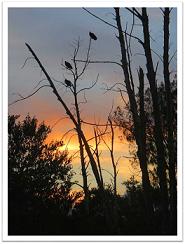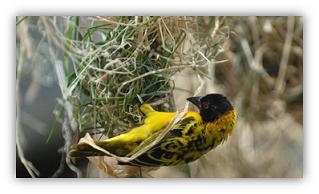This Is My Father's World The Case for Christian Treehugging
This Is My Father's World The Case for Christian Treehugging
Earlier this summer I had a unique experience with God's creation. My wife and I traveled to Thetis Island, one of the Gulf Islands found off the southeast coast of Vancouver Island in the Strait of Georgia. We were going to a camp for one night to visit some friends there.
 That evening, the camp staff invited us out to see the bioluminescence in the water. I had read about this phenomenon before in books, but I had never actually seen it. It was incredible. We went out in kayaks and as I paddled, the water I disturbed with the paddle blades sparkled and glowed. Light sparkled from the tips of my fingers like stars in the currents I generated. As I paddled through the water, streaks of light moved down into the water, likely the result of fish darting away as the kayak moved through the water.
That evening, the camp staff invited us out to see the bioluminescence in the water. I had read about this phenomenon before in books, but I had never actually seen it. It was incredible. We went out in kayaks and as I paddled, the water I disturbed with the paddle blades sparkled and glowed. Light sparkled from the tips of my fingers like stars in the currents I generated. As I paddled through the water, streaks of light moved down into the water, likely the result of fish darting away as the kayak moved through the water.
I found out later that the primary cause of the bioluminescence is a group of algae called dinoflagellates, especially two groups named Noctiluca (night light) and Pyrocystis (fire cell). It's thought that they give off light when disturbed in order to blind predators or to attract higher order predators to feed on the organisms that are feeding on them. Researchers are using bioluminescent organisms as pollution indicators. The more pollution there is, the fewer light producing organisms survive, and therefore the less light produced. Pollution levels are indicated by the amount of light produced.
The exhilaration of having light seemingly produced from the tips of my fingers caused me to reflect on what God was feeling when He was creating the heavens, flinging stars into the sky from his fingertips. Psalm 8 speaks of the heavens as the works of his fingers. And yet, learning about the practical use of these beautiful creatures made me stop and consider the powerful impact that we as humans have on the rest of creation. Even the microorganisms in the vast expanse of the sea are under our powder.
Psalm 8 also addresses this. It speaks about our role within creation. "You made him ruler over the works of your hands; you put everything under his feet: all flocks and herd, and the beast of the field" (Psalm 8:6, 7). This passage is a reflection of Genesis 1:28, the so-called cultural mandate: "Be fruitful and increase in number; fill the earth and subdue it. Rule over the fish of the sea and birds of the air and over every living creature that moves on the ground." It is evident therefore from both God's Word and his work, that we have been given stewardship over all creation. We have been given a position of power and responsibility.
This generates the two presuppositions that should undergird all discussions about the environment. First of all, God created it. Secondly, God placed humans as rulers or stewards over creation. I would like to elaborate on these two points to come to a general understanding of why we as humans, and especially, as Christians, should care for creation, demonstrating creation stewardship.
God Created It⤒🔗
The very nature of the word "creation" implies that there is a creator. God created the world out of nothing. He owns creation (Psalm 95:4, 5), is active in it, and continues to sustain it (Psalm 145:16, Matthew 6:26, 30). God also rejoices in his work, just like human artists who rejoice in work well done (Psalm 104:31). God created the universe with certain attributes He has revealed to us in Scripture.
What are these attributes? Firstly, in the first chapter of Genesis God declares that creation is good, not just once but a number of times. In all literature, including Scripture, repetition is a means of emphasizing something important. Secondly, creation reveals God and his attributes to us. Scripture tells us that creation speaks about God to all nations (Psalm 19:1-6), revealing his eternal power and divine nature, leaving all men without excuse (Romans 1:18-20). Thirdly, creation itself worships God (Psalm 148). The sun, moon, and stars, great sea creatures, lightning, snow, cattle, birds, young men and old, peasants and kings are all capable of praising God. Lastly, creation suffers with us and because of our fall creation will share in our redemption and restoration (Romans 8:19-22). God cares about the earth and will not allow us to be destroyed. According to Scripture, creation will be better off after the day of redemption (Ezekiel 47:6-12, Isaiah 11:6-9). Creation looks forward to Christ's return, when He will come to judge the earth (Psalm 96:10-13).
It is not difficult for us to acknowledge these points. It is like saying, "Jesus is Lord!" Easy to say, more difficult to apply. We know that God is the Creator of all things, including the earth. We accept as fact that as Creator, God also owns creation and sustains it. If God were to relax his sustaining hand, that very second creation would cease to exist. Lastly, we all are aware that God has placed our species, Homo sapiens, as stewards over his creation, to rule the earth, fill it, and subdue it. But what difference does this all make?
We Take Care of It←⤒🔗
First of all, since creation reveals God, then one way to learn more about God is to study creation. If we acknowledge God as the Creator, then He is like an artist and creation is his art. One of the ways of getting to know an artist is by studying his work. Calvin, in his Institutes of the Christian Religion, wrote,
"While it is true that God declares Himself to us by His Word, nevertheless we are inexcusable when we have not at all considered Him in His works … Let us note then that St. Paul says, (Acts 14:17) that when God causes the sun to shine, sends the diverse seasons, fructifies the earth, that He does not at all leave Himself without good testimony … Let us then only open our eyes and we will have enough arguments for the grandeur of God, so that we may learn to honor Him as He deserves.
 Through studying creation, we will learn more about God.
Through studying creation, we will learn more about God.
Secondly, if God loves creation and cares for it, so should we. Francis Schaeffer, in his seminal work on Christianity and creation, Pollution and the Death of Man, wrote, "If I am going to be in the right relationship with God, I should treat the things he has made in the same way he treats them."
John Stott, another Christian writer, in the introduction to a book called Under the Bright Wings, written by Christian conservationist Peter Harris, stated, "Christian people should surely have been in the vanguard of the movement for environmental responsibility, because of our doctrines of creation and stewardship. Did God make the world? Does he sustain it? Has he committed its resources to our care? His personal concern for his own creation should be sufficient to inspire us to be equally concerned." Our goal as Christians is to be imitators of God (Ephesians 5:1); if God loves and cares for his creation, so should his children.
If we do love and care for creation as God does, how should this be manifest in our lives? In general terms, we should behave as servant rulers over creation. Godly rulers will do what is best for their subjects, placing their subjects ahead of their own interests. Psalm 72 and Deuteronomy 17 tell us this is the way kings should behave and they describe the resulting blessings for their subjects. This is a powerful analogy that also describes Christ's rule over us. Who would not wish to have a ruler like this?
From a negative perspective, we should not waste or destroy creation actively or by neglect. Nor should we pollute it, filling it with our waste. We should not diminish creation any more than is necessary to meet our needs. Interestingly enough, this ties in directly with what is perhaps the greatest idolatry of our North American society, materialism. Materialism, worship of the god Mammon, causes us to place our own wants ahead of God, ahead of the needs of his creation, and ahead of the needs of future generations, our children and grandchildren.
 From a positive perspective, we are free to do many things on behalf of creation. I am convinced that humans have a necessary role within creation to fight against the effects of sin and to help creation fulfill the roles God has given it. God commanded creation to be fruitful in Genesis 1:22, and we can help creation fulfill that command. God, through the fruitfulness of his creation, will fill our needs and more, giving us much to share with others in need. As Christians, our role in creation is also similar to our role in society, to work towards its restoration.
From a positive perspective, we are free to do many things on behalf of creation. I am convinced that humans have a necessary role within creation to fight against the effects of sin and to help creation fulfill the roles God has given it. God commanded creation to be fruitful in Genesis 1:22, and we can help creation fulfill that command. God, through the fruitfulness of his creation, will fill our needs and more, giving us much to share with others in need. As Christians, our role in creation is also similar to our role in society, to work towards its restoration.
Typically, Christians have used the word "stewardship" only in the context of money. Creation stewardship is much broader than just economics, and is something we need to spend a great deal more time thinking about and taking a more active role in. When it comes down to it, Christians have a better reason than anyone for caring for creation. It is God's world, for which He loves and cares. What better reason do we need?

Add new comment